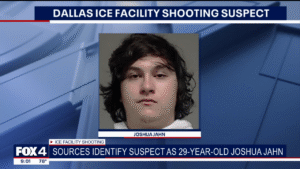Advertisements
On September 24, 2025, a tragic incident unfolded at an ICE facility in Dallas, Texas. The suspect, 29-year-old Joshua Jahn, opened fire on the Immigration and Customs Enforcement (ICE) building and a transport van, killing one detainee and critically injuring two others. Jahn ended the horrific rampage by taking his own life, leaving the community—and the nation—stunned.
At first glance, Jahn’s actions seem almost out of place. His family, friends, and those who knew him have expressed disbelief at the idea that he would commit such violence. Jahn, according to his brother Noah, was not someone who showed signs of radical political views. “He wasn’t particularly political,” Noah said, reflecting the confusion that surrounds his brother’s actions. His mother, Sharon, barely able to speak through her sobs when contacted by the press, echoed the same sentiment, struggling to comprehend what had led her son to such a deadly act.
Advertisements
The event began at around 6:20 a.m. when Jahn, armed with a rifle, indiscriminately fired at the building and a transport van in the facility’s sallyport. The chaos left one person dead, two others injured, and the entire community in disbelief. Jahn’s body was later found on the roof of a nearby immigration attorney’s office, deepening the eerie nature of the event. As authorities piece together the details, they’ve found unspent shell casings near his remains, some marked with anti-ICE messages, which adds another layer of complexity to the situation.
Despite the apparent political message suggested by the shell casings, Jahn’s family insists that he never expressed strong feelings about ICE or its operations. His brother, Noah, emphasized that Jahn never mentioned any animosity toward the agency, a sentiment that contradicts what investigators have uncovered. It’s this inconsistency that has made the situation even more puzzling for those closest to him.
While law enforcement works to determine the exact motive, it’s clear that this event touches on a broader issue—the heightened tension surrounding immigration policies. ICE, already a deeply controversial agency, has faced mounting criticism for its handling of detainees, and this attack may reflect the deepening societal rifts related to immigration enforcement in the United States.
What makes this tragedy even harder to understand is Jahn’s background. His criminal record is not extensive. In 2016, he was convicted of a felony for marijuana delivery, a charge that led to probation. But there was nothing in his history that suggested he would resort to such violence. This raises difficult questions about how a person, seemingly so disconnected from political causes, could suddenly commit such a violent act.
Jahn’s tragic story adds to the ongoing debate about the societal factors that lead to such violent outbursts. While much of the public discussion has focused on the larger political and ideological context, this incident is a reminder that individuals, too, struggle with personal demons that may not always be visible to those around them. Jahn’s family, in their sorrow, are left trying to understand what drove him to this point.
ICE itself is under pressure from both sides of the political spectrum. On the one hand, it has been tasked with enforcing increasingly stringent immigration laws, leading to a rise in tensions and distrust between the agency and the communities it serves. On the other hand, the agency is under immense pressure to recruit thousands of new agents amid increasing demands for its services. The pressure on the agency, combined with internal morale issues, has contributed to a tense and volatile environment, one that may have indirectly played a role in the events of that morning.

As more information comes to light, the picture of who Joshua Jahn was and why he did what he did will become clearer. But for now, his family and the community are left with more questions than answers. It’s easy to get lost in the headlines of political conflict and institutional dysfunction, but at the heart of this tragedy is a young man who left behind family, friends, and a future full of potential—now tragically cut short by a moment of violence.
Joshua Jahn: A Portrait of Contradictions
| Personal Information | Details |
|---|---|
| Full Name | Joshua Jahn |
| Age | 29 years old |
| Location | Dallas, Texas |
| Known For | Suspected shooter in the Dallas ICE facility attack |
| Criminal History | Felony conviction for marijuana delivery in 2016 (resulted in probation) |
| Professional Information | Details |
|---|---|
| Occupation | Not explicitly known; no significant career history |
| Political Views | Not politically active, as per family and friends |
| Last Known Activity | Opened fire on a Dallas ICE facility, resulting in one death and two injuries |
For more detailed information, visit NBC News.
The Bigger Picture
As law enforcement officials continue their investigation, it’s essential to remember that the actions of individuals like Joshua Jahn are often influenced by a complex array of factors—personal struggles, societal pressures, and, in some cases, ideological motivations. Jahn’s life and the circumstances that led to the tragedy in Dallas reflect the deepening divides in American society, particularly around issues of immigration. While the true motive behind his actions may never be fully understood, it serves as a painful reminder of how volatile the situation surrounding immigration enforcement can be, both for the agencies involved and the individuals who are caught in the crossfire.
As the community continues to grieve, the question remains: What drove a man, seemingly detached from politics, to carry out such a violent act? The answers are still unfolding, but one thing is certain—this event will continue to spark conversations about the broader societal issues surrounding immigration, law enforcement, and the personal lives of those who feel pushed to the edge.
Advertisements